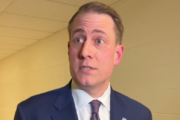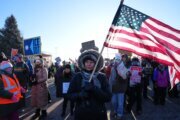As more states work to reopen, knowing who has the coronavirus is key. One way to do that is with contact tracing, which is the process of tracking down anyone who may have come into contact with a person who has tested positive.
New York City, for example, says it plans to hire 1,000 people to help with that effort by the end of the month. Nationally, experts say it will take an army of people, asking the right questions.
People like Melissa Thomas in Connecticut, who is chasing some of the newest cases of the virus every day. Thomas calls people who have tested positive, asks them when they first started feeling ill, and if they had “prolonged contact” with anyone outside their house since that time.
Her mission is to break the chain of infection by developing a list of everyone who may have been significantly exposed to a patient and urging them to monitor symptoms and self-quarantine.
Thomas said she can usually reach about 60% of the patients she tries, getting all the info she needs in less than 30 minutes.
“I think the hardest part is getting the people to answer the phone in the first place. For those that we actually reach out and talk to, whether they answer the phone or call us back, they’re very willing to help,” Thomas told “CBS This Morning” co-host Tony Dokoupil.
Contact tracing has helped control diseases like Ebola and SARS. And as of now, it also seems to be working for the New Haven Department of Public Health in Connecticut, where Thomas is a volunteer.
“We’re doing between two to three [calls] an hour,” Thomas said. “In New Haven, we’ve averaged about 100 new cases a day, and with our team, we’re able to handle that.”
But there’s no federal requirement for contact tracing, leaving states and cities to create plans of their own.
“I think it’s important for us to come up with a strategy that says we’re not just going to try andmitigate the disaster; we’re actually going to try and contain the growth of the virus,” said Massachusetts Governor Charlie Baker.
Baker announced the first statewide contact tracing program last month. It’s grown into a 1,000-person team, reaching hundreds of patients a day.
“People want to talk about what it means to have this virus,” Baker said. “They’re looking for help with respect to how they isolate, and they’re willing to give us their close contacts, which by the way, so far, have not been big numbers.”
But those numbers are likely to spike as people return to work. To stay ahead of the pandemic, America will need an additional 100,000 contact tracers, according to Johns Hopkins University. An NPR investigation found states have hired or announced plans to hire about 66,000 so far.
If there were national standards or rules around contact tracing, “that could be very helpful,” Baker said.
“There is a lot of back-and-forth between states, and people move. I mean, they don’t just work; they move,” he said.
As more Americans test positive for the virus, researchers say confidentiality is key for contact tracing, which means shielding the identity of every COVID-19-positive patient even from the people they may have infected.
Responding to concerns some Americans may have about their privacy, Thomas said, “We take confidentiality very seriously.”
“That’s a big component of what we do, as far as not sharing information of who is a positive test result. That is extremely important,” she said. “But also, by notifying people that they may have been exposed, it greatly reduces the spread of the disease, so the more information people can provide, the better and the more effective that this technique will be.”
Technology is also expected to play a big role in the effort. Google and Apple this month are expected to debut a tool allowing people to receive an automatic alert if their phone has been near a COVID-19-positive person.
But for many people, that brings up more privacy concerns. A recent poll found more than half of Americans wouldn’t use such an app.







